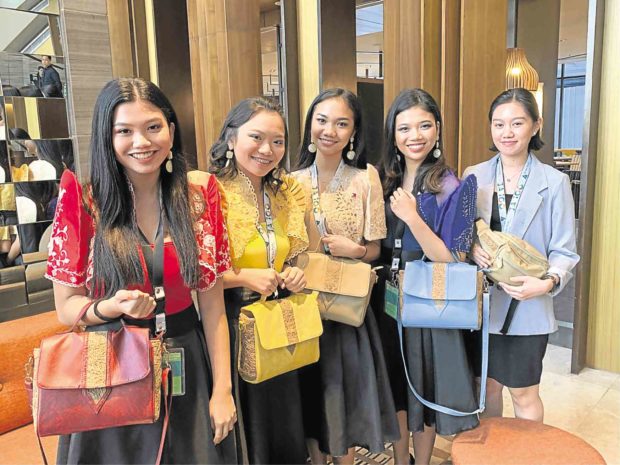These 12th graders from St. Scholastica’s College are first-time entrepreneurs, but this early, they have decided that their business should not just be about making a profit. It must also have a meaningful impact on the people and the planet.
Supported by an entrepreneurship module of their school, 16 girls formed Terra, a mini-company that fashions coconut waste materials, recycled textiles and faux leather into “Isla,” a line of handbags, and “Bucko,” a line of belt bags.
Fleshing out a business plan drafted when they were in Grade 11, these kids designed their products, organized their supply chain and started selling their coco bags last December, making use of the digital space to reach out to an international market.
Terra targets mostly young women—the “trend-setters, the go-getters and the dream-chasers.”
Represented by four of its officers Alaina Carlize Tria (chief executive officer), Raphaella Mae Sanchez (executive vice president for human resources), Porsha Mangilit (corporate secretary) and Gwen Villaver (marketing executive vice president), Terra rocked the 2019 Asia-Pacific Junior Achievement (JA) Company of the Year (COY) competition.
Terra won first place at the COY awards, beating 19 other student companies from 13 territories across Asia-Pacific.
It also won a special citation, the FedEx Access Award, for demonstrating a good understanding of global connectivity in its business model.
This competition, held in the Philippines for the first time, is JA Asia-Pacific’s annual celebration of the achievements of young entrepreneurs in the region. The program helps young people understand the role of business in the global economy by allowing students to organize and operate an actual business enterprise, and market and sell a product or service in the real world.
Student companies from Australia, Brunei, China, Guam, Hong Kong, India, Indonesia, Japan, Korea, Malaysia, Philippines, Singapore and Thailand participated in this competition. The winners were announced at the JA Asia-Pacific COY Awards Dinner at Shangri-la Makati on March 13.
Terra started with a seed money of P39,000, of which P16,000 was provided by their school (P1,000 for every student member). Some members also contributed their money while an angel investor put in P5,000.
After raising their capital, the girls had to find a manufacturer who can deliver their complex design. It was quite a challenge because coconut coir is not a usual material for bag makers and most of them require a large minimum volume which Terra could not afford. The girls had to contact 20 manufacturers before finding one that they could work with.
“What I like about our company is we have purpose in every detail. Everything that comes with it— from the raw material to the (creation) process, to the beneficiaries, it has purpose,” Tria said.
Terra sources its coconut coir from Pilipinas Ecofiber Corp., a social enterprise which also has a triple bottomline goal like Terra. The girls were drawn to this supplier because it cares for coconut farming communities.
For the inner lining of its bags, Terra uses recycled textiles which are patched up by local sewers from Mandaluyong and Antipolo, thereby helping in job creation. The girls also partner with Tuluyan San Benito – a shelter for the homeless – to employ people in the creation of their coco bags.
At a price of around $23 or P1,200 each, Terra enjoys a profit margin of 42 percent. Since the girls started selling their bags last December, they have generated P86,400 in sales. They generated more than half of their sales from the overseas market, particularly from buyers from the United States and Canada. During the one-day bazaar held in Glorietta by the JA participants, their remaining stocks were all sold out long before the closing hour.
For Sanchez, this JA experience has taught her the important value of humility.
“Humility is accepting the fact that you really can’t do everything no matter how hard you try and to be human is to be flawed and with this, your members will be there to help you overcome your shortcomings and help you grow as a person and this is called teamwork,” Sanchez said.
For Mangilit, grit is her most important takeaway, noting the harsh realities that her mini-company had to overcome.
One thing that makes these girls stand out is their passion for their creation.
“My greatest learning from this experience is to have that passion for your company, to have that passion for your product and to have that passion in dealing with your members in unifying your team,” Tria said.
“JA really helped me pursue a deeper passion, find a deeper passion and deeper meaning in business. It taught me that business goes beyond having a product, selling to the market. You have to have social responsibility, care for the environment. You have to have purpose,” Villaver said.
Beyond mere compliance to school requirement or getting accolades from the JA competition, the girls are now making plans to grow the company even when they part ways to go to college.
Overwhelmed by the market reception for their product, they believe that college will not hinder the growth of Terra.
And with this exposure, all of the four Terra officers intend to be full-time entrepreneurs after college.
